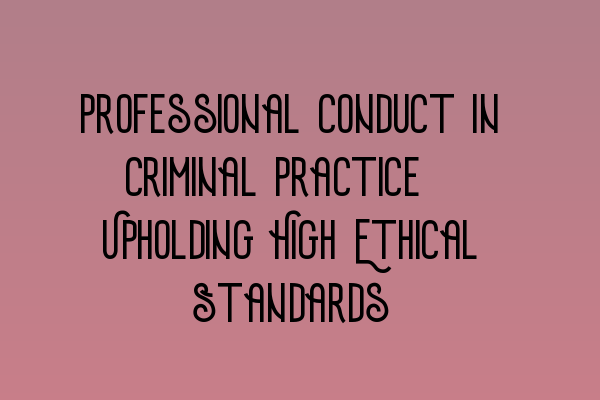Professional Conduct in Criminal Practice: Upholding High Ethical Standards
As criminal lawyers, it is our duty to not only provide effective representation for our clients but also maintain high ethical standards. Upholding professional conduct in criminal practice is crucial for the integrity of the legal profession. In this article, we will explore the importance of ethical behavior and discuss key guidelines that SQE Criminal Law & Practice professionals should follow to ensure they are providing the best legal service while abiding by the rules and regulations.
Adhering to the Code of Conduct
One of the fundamental aspects of maintaining professional conduct is adhering to the Code of Conduct set by the Solicitors Regulation Authority (SRA). The SRA Code provides guidelines and principles that all solicitors must follow to ensure they act in the best interests of their clients and the legal profession as a whole. It is essential for criminal law practitioners to familiarize themselves with the SRA Code and incorporate its principles into their daily practice.
By following the SRA Code, criminal law practitioners demonstrate their commitment to honesty, integrity, and professionalism. This not only enhances the reputation and credibility of individual solicitors but also contributes to the overall public confidence in the legal system.
Confidentiality and Client-Attorney Privilege
Confidentiality is a cornerstone of the attorney-client relationship. As criminal lawyers, it is our duty to keep all information shared by our clients confidential, unless disclosure is required by law or authorized by the client. Upholding client-attorney privilege is essential to maintain trust and ensure clients feel comfortable sharing sensitive information that may be crucial to their defense.
It is important to remember that breaches of confidentiality can have severe consequences, both for solicitors and their clients. In addition to potential disciplinary action, a breach of client confidentiality can cause irreparable harm to a client’s case and reputation. Therefore, it is vital for SQE Criminal Law & Practice professionals to prioritize and uphold client confidentiality at all times.
Conflict of Interest
A conflict of interest arises when a solicitor’s duty to one client conflicts with their duty to another client or a third party. It is crucial for criminal law practitioners to identify and address potential conflicts of interest promptly. Failure to manage conflicts of interest can compromise the solicitor’s ability to provide objective and impartial advice, potentially resulting in a breach of professional conduct.
To maintain high ethical standards, it is necessary to establish robust conflict-checking systems and regularly review potential conflicts, particularly when representing multiple clients or interacting with opposing parties. By identifying and addressing conflicts of interest, criminal law practitioners can ensure that they are providing the best possible representation to their clients while avoiding any violations of professional conduct.
Continuing Professional Development
Professional conduct in criminal practice extends beyond ethical behavior during client representation. It also includes a commitment to ongoing learning and development. As legal professionals, it is essential to stay up-to-date with changes in criminal law, procedural rules, and legal precedents.
Participating in formal continuing professional development (CPD) activities, such as SQE 2 Preparation Courses or SQE 1 Preparation Courses, helps solicitors enhance their knowledge and skills. By proactively engaging in CPD, criminal law practitioners demonstrate their dedication to providing high-quality legal services and staying informed about the latest developments in their field.
Conclusion
Upholding high ethical standards is an integral part of professional conduct in criminal practice. By adhering to the SRA Code of Conduct, maintaining client confidentiality, managing conflicts of interest, and actively pursuing ongoing professional development, criminal law practitioners can ensure they are providing the best legal service while upholding the integrity of the legal profession.
For more information and resources on criminal law practice and preparation for the SQE exams, please visit the following links:
- SQE 1 Practice Exam Questions
- SQE 1 Practice Mocks FLK1 FLK2
- SQE 2 Preparation Courses
- SQE 1 Preparation Courses
- SRA SQE Exam Dates
